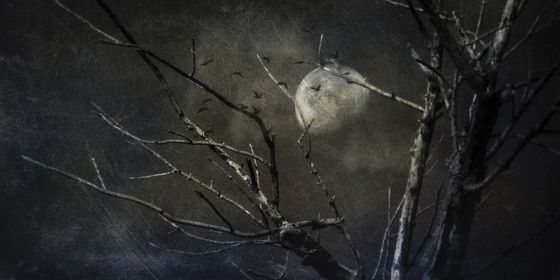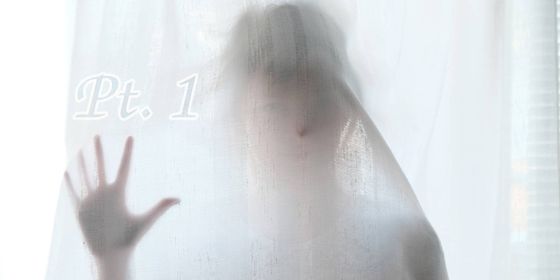According to traditional Chinese beliefs, death doesn’t stop one sending messages to the living
The seventh lunar month is this year’s Chinese Ghost Month, and today (the fifteenth) is Ghost Day (鬼节/中元节, also known as Hungry Ghost Festival). If the streets tonight are clogged with families making burnt offerings to the deceased, there’s a possibility that they were prompted by an illness or dream.
Traditionally, the Chinese pay tribute to their ancestors and any wandering souls by preparing food offerings, and burning paper money (known as “Hell Bank Notes”) and clothing to the deceased. The dead, it seems, need material goods as much as the living, and Ghost Day is a whole night dedicated to these transactions. But even during their regular wanderings in the remainder of the year, Chinese ghosts aren’t without ways to communicate with the living, whether it’s giving out lottery numbers or exacting revenge…. or just asking for a handout.
Dream omens
Dreams have been a central part of classic Chinese spiritual beliefs for several millennia. There’s a saying that “what one thinks in the daytime may become dreams during the night (日有所思, 夜有所梦).” The Chinese also traditionally believed that ghosts can appear in the dreams of their relatives to communicate about their fate or tell fortunes. In China’s rural areas especially, it’s common to hear once or more locals tell about their dreams of the deceased, which may even spread like ghost stories and urban legends.
If the ghost is an ancestor or dead relative, it’s common for the dreamer to say that the ghost is hungry or cold, in need of money or clothes (this may come in the form of a direct communication, or simply a scenario in which the ghost seems extremely thin or poorly dressed). The problem is easily fixed by the relative making a burnt offering of clothes or paper money.
Likewise, if the ghost appears near water, it supposedly indicate that their tomb is damaged by or immersed in water, and the family member need to check. If they fail to listen, such dreams are believed to haunt, or even bring bad luck to the family in the near future.
Then there’s the feng shui (风水) of the ancestor’s tomb. Bad feng shui will mess with a deceased’s descendants for many generations unless they move the tomb to a good location, ideally with the help of a feng shui master.
A ghostly dream may also be a death omen. A deceased family member may show to say that they’re taking another dying family member away, often assuring that they will be taken good care of in the afterlife. More rarely, the ghostly delegate may be a stranger, like some bureaucratic messenger of the netherworld, or even a malicious ghost coming to take the soul in revenge.
Someone who died unnaturally or suddenly may also appear in the dreams of relatives or even strangers to send information about their death. In 2014, CNTV reported that the older sister of a missing man told the policeman she dreamed of her brother’s death, providing information on where his body was hidden that later proved to be accurate—an eerie coincidence with echoes of the famous Red Barn Murder.
Messages from the dead are not always grim: There may be hints about winning lottery numbers or warning that family member are in danger, such as this urban legend about a trucker snoozing in his truck, who received a message from his deceased dad to move his vehicle and was thus saved from being hit by another vehicle. Many such stories have been circulated among locals as legends. Chinese would contribute such good luck to the power of their ancestors or good feng shui of ancestors’ cemetery.
Messages sent via illness
Many people in rural areas still believe that, if a person falls deliriously ill all of sudden, their sanhunqipo (三魂七魄, “three finer spirits and seven animal spirits” that animate the human body, according to Daoist theory) have been taken away. The sufferer is said to have caused their ancestor or an unknown soul some offence. Children are considered particularly susceptible, as they have a lot of yin energy (阴气).
In my own village in Hengyang, Hunan province, stories of seizures with supernatural causes are prevalent. One little girl reportedly began to speak nonsense while helping her grandmother to cook, and later fell into a bucket of water, acting “like she had been haunted by another soul.” The grandmother took immediate action: She laid one chopstick horizontally on the table and tried to stand the other upon it vertically, while calling names of all their deceased family members, one after another. Nothing happened, but when the grandma then called the guhun yegui (孤魂野鬼, lonely wandering souls) and promised food to them, the second chopstick stood vertically on the other, and then the little girl recovered. (According to villagers, children may offend dead souls if they, among other things, block the way to the table where food is being offered to the dead, or if they sit at the table while offerings are being made)
Of course, messages from the ghosts are sometimes difficult to decipher,what with them being dead and hard to read. Some families will call in the services of a local shenpo (神婆, witch), who will find the cause of the illness and advise how to relieve it.
Are any of these messages from the dead real? It depends on what you believe. Cases where an omen proves to be true are likely to be overstated, and are then elaborated upon in the spreading; omen which turn out to be nothing (or useless cures) are quickly forgotten. This creates a bias that tends to favor the supernatural. Nevertheless, as the Chinese saying goes, “It’s better believe and have it be untrue, than not believe and have it end up being true(宁可信其有,不可信其无)”: In other words, as per Pascal’s Wager, better safe than sorry.
Cover image from baike.baidu.com












